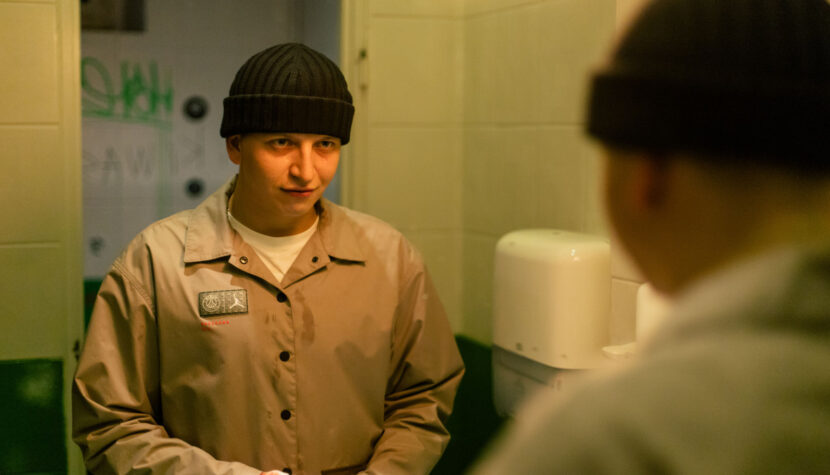FREESTYLE. Uncut Gem [REVIEW]

Rap is doing quite well in Polish cinema – we regularly produce films in which this specific genre of music plays a significant role. Sometimes, the starting point is the biography of a real artist. Other times, it’s the authors’ imagination, translating into a story about a boy or a girl from the housing estates, fighting for a better tomorrow. Interestingly, Maciej Bochniak’s Freestyle doesn’t belong to either of these groups. Rap is used here somewhat instrumentally – as bait for the audience. Something entirely different is at play here, namely, the loop tightening around the main character’s neck.
Diego (Maciej Musiałowski) finds himself in an enviable situation. He dreams of making a record – just like every protagonist in a Polish film with rap in the background – but life ruthlessly throws obstacles in his path. The biggest one turns out to be his best friend – Mąka (Michał Sikorski). First, he steals an expensive microphone from the recording studio, and then he drags the main character into smuggling cocaine to Slovakia, which ends, euphemistically speaking, in failure. Trying to save his reckless friend, Diego himself gets entangled in an invisible web more and more tightly. His goal is to extricate himself from it and regain the freedom to act.

Bochniak’s film is first and foremost patronized by the Safdie brothers, the creators of films like Good Time and Uncut Gems, as well as the early Nicolas Winding Refn – the one before he moved to the United States, from the time of Bleeder and the Pusher trilogy. In essence, the author of Freestyle aims for the same thing – creating a suffocating atmosphere that captivates the viewer through the constantly deteriorating situation of the main character.
He certainly succeeded on the directorial level. The handheld camera never leaves the protagonist’s side, faithfully following him even when the ground is slipping from under him. It often gets close to his face, capturing his reactions – grimaces of pain, dissatisfaction, and above all, stress. Freestyle is undoubtedly a character-driven movie, which means that Maciej Musiałowski got ample room to shine. The actor practically never leaves the screen – he jumps, runs, fights, although he’s more often on the receiving end of blows. From time to time, he raps something – usually about his ambivalent relationship with the Polish police. He remains in constant motion, translating his emotional state into physical turmoil. It’s not as psychologically nuanced a role as Komasa’s in The Hater, but it’s still a creditable performance.
The Snowball Effect
However, Bochniak didn’t manage to achieve the same narrative fluidity as the Safdies and Refn did. In Good Time, Uncut Gems, and the Pusher series, the creators skillfully built a snowball effect. They constructed a precise narrative machinery that gained momentum as the film progressed – one problem organically led to another, and solving the first one created the third, and so on. There was no stopping it. The characters ultimately found themselves in a tight spot – for some of them, the only way out with their lives intact was to escape, ending up either on a bus to another country or with a bullet in their heads.

At one point, Diego also contemplates escaping the country. However, his dilemmas lack a similar narrative fluidity. The world of the protagonist doesn’t collapse like a snowball effect but rather like a chaotic freestyle, spun by a mediocre rapper. Failed drug deals and debt repayment are joined by mafia vendettas and the struggle to recover recordings from the studio. And, of course, the obligatory love subplot – fate has it that the girl Diego secretly meets is involved with a gangster named “Baton”. And it’s “Baton” who, suspecting the girl of betrayal, is tasked with collecting Diego’s debts. There’s too much randomness here straight out of a bad romantic comedy (especially in the finale), which results in the screenplay seams becoming visible as the threads of the story are woven together. Safdie and Refn’s films made such a profound impression because the dire situations of the protagonists seemed natural, unavoidable – like the inevitable hard landing after jumping out of an airplane without a parachute. Watching Freestyle, you won’t experience the same feeling. Especially since the protagonist – until the very end – has a parachute in the form of a “rich old man.”
Bochniak made his feature debut in an extremely original way – Disco Polo remains one of my favorite Polish films of the 21st century. It was postmodern pulp that didn’t take anything or anyone seriously. And that’s what made it beautiful. Then came Magnezja, and now Freestyle. Bochniak cannot be denied courage and consistency in his artistic exploration – however, the results leave something to be desired. It’s as if the novice director knew better what he wanted to say – without pretensions and excessive ambitions. Call me tasteless, but in this case, I would definitely place the noble sounds of disco polo above the aggressive chaos of street rap.

